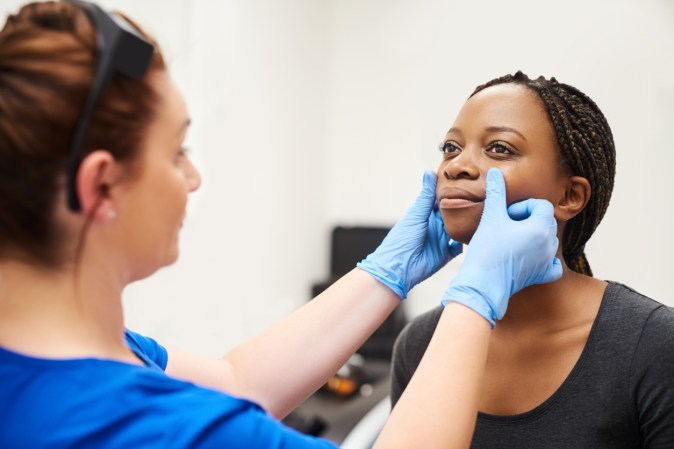These guidelines aim to ensure patient safety and wellbeing, while also ensuring that patients receive accurate and transparent information about the risks and benefits of cosmetic procedures
The Australian Health Practitioner Regulation Agency (AHPRA) has recently released new guidelines for medical practitioners performing cosmetic surgery and non-surgical cosmetic procedures. These new guidelines will come into effect as of July 2023.
It is important to note that the below does not apply for non-surgical procedures, such as injectables. Several media outlets have published misinformation surrounding this and have created unnecessary panic among clients, who fear they need a GP referral whenever they want their anti-wrinkle or filler topped up. For injectables (or other non-surgical aesthetic treatments), the new guidelines state that the practitioner needs to “assess the patient’s reasons and motivation for requesting the procedure including external reasons (for example, a perceived need to please others) and internal reasons (for example, strong feelings about appearance). The patient’s expectations of the procedure must be discussed to ensure they are realistic.”
New guidelines for cosmetic surgery
One of the key requirements of the new guidelines is the assessment of patient suitability. All patients seeking cosmetic surgery must have a referral, preferably from their usual general practitioner, or from another general practitioner or specialist medical practitioner if necessary. The referring practitioner must also not perform cosmetic surgery themselves and must work independently of the practitioner who will perform the surgery – who also must assess the patient’s reasons and motivation for seeking surgery, discuss their expectations, and ensure that these expectations are realistic.

Patients should also be asked if another practitioner has declined to provide them with cosmetic surgery, as this will also flag for denial of surgery or warrant further assessment into why the patient is seeking the surgery, such as screening the patient for underlying psychological conditions such as body dysmorphic disorder, using a validated psychological screening tool. If the screening indicates that the patient has significant underlying psychological issues, they must be referred to a psychologist, psychiatrist or general practitioner for evaluation.
What will the process be for initial consultations?
In terms of consultation requirements, patients seeking cosmetic surgery must have a minimum of two pre-operative consultations. The first consultation must be conducted by the medical practitioner who will perform the surgery or a registered health practitioner working with them, not a patient advisor or agent. At least one consultation must be conducted in-person with the medical practitioner who will perform the surgery, while other consultations can be in-person or via video. Patients cannot be required to sign consent forms during the first consultation, and the decision to undergo the surgery must be made during a subsequent consultation with the medical practitioner who will perform the procedure, either in-person or via video.
Following two consultations and informed consent, a minimum cooling-off period of seven days is required before booking the surgery or paying a deposit.

The guidelines also require medical practitioners to decline to perform the surgery if they believe it is not in the best interests of the patient. In addition, when a medical practitioner performs cosmetic surgery in a location other than their primary place of practice, they must remain available at that location for at least 24 hours after the surgery. After this initial period, ongoing post-operative care may be delegated to other practitioners.
These guidelines aim to ensure that patients receive high-quality care and are fully informed about the risks and benefits of cosmetic procedures. By requiring multiple consultations, cooling-off periods, and screening for underlying psychological conditions, the guidelines aim to ensure that patients are making informed decisions about their cosmetic procedures. The guidelines also aim to ensure that medical practitioners are acting in the best interests of their patients and providing appropriate care before, during, and after cosmetic procedures.
In summary:
- A GP referral will now be needed for those seeking cosmetic surgery (this does not apply to non-surgical procedures)
- Stricter advertising regulations around cosmetic procedures, including the recent ban on using influencer testimonials
- All patients under the age of 18 require a psychological evaluation before cosmetic surgery, and should not be prescribed botulinum toxin and dermal filler
- Patients must complete validated psychological assessment tools prior to undergoing surgery (such as body dysmorphic disorder screening tools), and be referred on if necessary
- Options should be discussed with the patient, including not having the procedure
Read SPA+CLINIC’s latest issue here:
There are 5 ways you can catch up with SPA+CLINIC
- Our quarterly print magazine, delivered to your door. Subscribe here.
- Our website, which is updated daily with its own completely unique content and breaking news.
- Our weekly newsletter – free to your inbox! Subscribe here.
- Our digital magazine – click here to view previous issues.
- Our social media – see daily updates on our Instagram, Facebook & Linkedin




